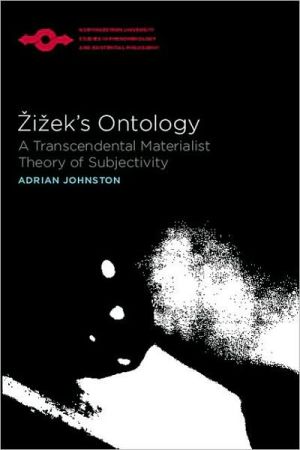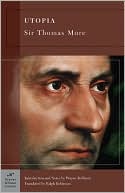Zizek's Ontology: A Transcendental Materialist Theory of Subjectivity
In Zizek's Ontology, Adrian Johnston focuses on the generally neglected philosophical core of Slavoj Zizek's work-on his efforts to use psychoanalysis (particularly the teachings of Jacques Lacan) to redeploy the insights of late-modern German philosophy (especially the thought of Kant, Schelling, and Hegel). Johnston employs Zizek's combination of philosophy and psychoanalysis to address two vexing philosophical problems: the relationship of mind and body and the nature of human freedom....
Search in google:
Slavoj Žižek is one of the most interesting and important philosophers working today, known chiefly for his theoretical explorations of popular culture and contemporary politics. This book focuses on the generally neglected and often overshadowed philosophical core of Žižek’s work—an essential component in any true appreciation of this unique thinker’s accomplishment. His central concern, Žižek has proclaimed, is to use psychoanalysis (especially the teachings of Jacques Lacan) to redeploy the insights of late-modern German philosophy, in particular, the thought of Kant, Schelling, and Hegel. By taking this avowal seriously, Adrian Johnston finally clarifies the philosophical project underlying Žižek’s efforts. His book charts the interlinked ontology and theory of subjectivity constructed by Žižek at the intersection of German idealism and Lacanian theory. Johnston also uses Žižek’s combination of philosophy and psychoanalysis to address two perennial philosophical problems: the relationship of mind and body, and the nature of human freedom. By bringing together the past two centuries of European philosophy, psychoanalytic metapsychology, and cutting-edge work in the natural sciences, Johnston develops a transcendental materialist theory of subjectivity—in short, an account of how more-than-material forms of subjectivity can emerge from a corporeal being. His work shows how an engagement with Žižek’s philosophy can produce compelling answers to today’s most vexing and urgentquestions as inherited from the history of ideas.
ZIZEK'S ONTOLOGY\ A Transcendental Materialist Theory of Subjectivity \ \ \ By Adrian Johnston \ Northwestern University Press \ Copyright © 2008 \ Northwestern University Press\ All right reserved.\ \ ISBN: 978-0-8101-2456-1 \ \ \ \ \ Chapter One Failure Comes First: Negativity and the Subject \ Thinkers committed today to an ongoing explication of Kantian philosophy and its German idealist variants tend to see themselves as embattled guardians of the notion of subjectivity defending against a barbarous onslaught of postmodern attacks upon the very idea of any subject whatsoever. A certain antagonistic dehiscence, closely paralleling the fictitious border between nineteenth-century Germany and postwar France, seems to run through large sections of an intellectual domain loosely referred to under the heading of "continental philosophy." Those influenced by Kant and his immediate successors often accuse deconstructionists and their ilk of promoting an incoherent and nihilistic relativism-for which the only true remedy is a return to the modern subject and its accompanying set of Enlightenment principles. The preferred philosophical method of these sorts of scholars in the European tradition is immersion in careful textual/historical exegesis, thus studiously avoiding the temptation to engage in jargonized, très chic "fashionable nonsense." On the other hand, representatives of the various "post" movements in contemporary continental theory have accused the heroes of such traditionalists of everything from quasi-fascistic, logocentric "totalitarianism" to phallocratic "colonialism." Although this description of the current theoretical scene is highly selective as well as a gross oversimplification-in addition, of course, the mutual misunderstandings between advocates of these various philosophical stances are rife-a tension between the historically motivated retrieval of modern subjectivity and the recent set of suspicions and criticisms of this same sort of subject is nonetheless a palpable feature of the present intellectual climate.\ A perfect example of precisely this conflict is Manfred Frank's critique of Jacques Lacan. In What Is Neostructuralism?, Frank engages in a sweeping survey of developments in twentieth-century European philosophy from Husserl up through Derrida. He observes that one of the distinguishing features of this period is the emergence of modes of analysis ostensibly dispensing with subjectivity as a central theoretical point of explanatory reference. The clearest instance of this trend is, obviously, classical structuralism à la Claude Lévi-Strauss, a system of thought aptly described by Paul Ricoeur as "Kantianism without a transcendental subject" (a description that Lévi-Strauss himself endorses). In place of an idealism positing certain subjective factors as necessary possibility conditions for the constitution of experiential reality itself, orthodox structuralism asserts that a trans-individual, socio-symbolic matrix of representations, practices, and institutions entirely overdetermines individual cognition and identity. In Lacanese, this would be to say that the subject is nothing more than a puppet of the "big Other," a mere slave of the symbolic order; subjectivity is effectively eclipsed, overshadowed in being reduced to the epiphenomenal residue of, in Hegelian parlance, a purely objective (and objectifying) Geist.\ According to Frank, Lacan is a "neostructuralist," that is to say, an inheritor of the Lévi-Straussian legacy (more recently, Judith Butler also succumbs to the temptation to read Lacan this way). From Frank's point of view, the Lacanian distinction between the Symbolic je (i.e., the subject as subject of the signifier and of the unconscious) and the Imaginary moi (i.e., the reflected, specular ego tied to circumscribed conscious awareness), like so many other structuralist-inspired theoretical devices, is an inadequate, unsatisfying substitute for the German idealist conception of the self-reflective "I." Frank's position is grounded on the assumptions that reflexivity is an essential feature of subjectivity, and furthermore, that reflexivity is a property solely of the subject and nothing else-if it isn't self-reflexive/reflective, then it isn't a subject, and vice versa. Hence, Frank interprets Lacan's "I" (je) as a mere permutation of functions forming part of the trans-subjective symbolic-linguistic network in which the individual is embedded. Given the structural, Symbolic status of the unconscious in classical Lacanian theory ("the unconscious is structured like a language," "desire is the desire of the Other," and so on), the phrase "subject of the unconscious" is, for Frank, a contradiction in terms. A feature of a trans-subjective order can only ever itself be trans-subjective too, rather than being genuinely subjective. Does Lacan's reference to the moi (ego), this being the product of the mirror stage as a psychical moment or process involving the effects of reflection, get him any closer to formulating a satisfactory account of subjectivity in Frank's eyes?\ Frank contends that the Lacanian theory of the ego brings to the fore a circularity plaguing Lacan's entire discourse on subjectivity, as well as hampering nearly any possible variant on a structuralist or post-structuralist notion of the subject as a by-product or aftereffect of a non-reflexive structural system consisting solely of a network of differences (this being a leitmotif throughout postwar French thought). The account of the mirror stage is, according to Frank's interpretation of it, an attempt to explain the emergence of a "self," the genesis of the "I." In a moment of specular recognition mediated by the reflective surface of the mirror, the infant suddenly acquires its moi as the ground for an enduring, conscious self-identity (one should note, of course, that Lacan attaches a slew of qualifications to this idea, stipulating, for example, that this "recognition" is inherently a "misrecognition" [méconnaissance]). For Frank, Lacan is stuck having surreptitiously to presuppose the preexistence of that which he is trying to explain the coming-into-being of-that is to say, a self cannot emerge ex nihilo. Frank's argument is that the "moment of recognition" in the Lacanian myth of the mirror cannot occur unless the individual is already previously acquainted with him or herself as a self. Why does the body image reflected by the mirror strike the child as being something exceptional, as different in kind compared with the array of other objects in his or her visual field? How can a particular fragment of experience be latched onto as representative of a "me" in the absence of a prior sense of "me-ness"? Frank maintains that Lacan simply ignores this circularity as it pertains to the Symbolic je as well as the Imaginary moi:\ To the realm of the grand Autre ... Lacan attributes the mystical mode of Being of s'être, without either explaining or, what is more, justifying the use of the reflexive pronoun in this formulation. Either the true subject is absolutely irreflexive, in which case it is impossible to see how one can speak of it as though it were a subject at all, or else with the formulation s'être it is in fact ascribed a problematic familiarity with itself about which Lacan does not say a word. (Frank 1989, 309-10)\ Elaborating on the consequences of this philosophical dilemma for Lacan's theory, Frank categorically states:\ All attempts to derive consciousness from whatever relation between elements, no matter how it is constituted, are philosophically out of the question insofar as they always already presuppose consciousness ... one cannot possibly first want to destroy consciousness, only in order to reintroduce it later. The demolition of consciousness can result in many things, but it cannot generate consciousness, just as nothing comes out of nothing. If, however, in a circular manner one already presupposes consciousness, it becomes meaningless to talk about a derivation of this phenomenon. (Frank 1989, 313-14)\ Frank tries to force a choice between, on the one hand, a theory of the subject in which both consciousness and reflexive self-consciousness are primitive phenomena incapable of any sort of derivation and, on the other hand, a blanket denial of the existence of such subjectivity. There is either no genetic emergence of a state of selfhood from a state devoid of self, or else there simply is no self at all. After staging this either-or situation, Frank advocates the desirability of the former position (basically, the idealism of the early nineteenth-century German idealists) by pointing to the explanatory shortcomings of the latter position (in his view, a bald rejection of reflective subjectivity simply flies in the face of numerous observable facts of cognitive life). The Lacanian "third way," involving a philosophical radicalization of Freudian psychoanalytic meta-psychology (and, contra Frank's forced choice, arguably continuing a line of thought revealing itself in such unlikely sources as Schelling's engagements with Kant), is ruled out by Frank as invalid: a genetic theory of subjectivity is untenable. An obvious bone of contention here is the question of whether or not subjectivity should be entirely identified with the activities of consciousness.\ In a footnote to his essay "The Cartesian Subject Versus the Cartesian Theater," Zizek directly responds to Frank's critique of the circularity allegedly operative within Lacan's conception of the mirror stage. He insists that the only way in which this criticism could be plausible is if one totally ignores Lacan's distinction between moi and je:\ When ... Manfred Frank ... argues, against Lacan, that one cannot ground the subject in his identification with his mirror image (according to Frank, such an account "reifies" the subject, reduces him to an object of mirror-identification, and thus simply misses the proper dimension of subjectivity), one can only stare at this line of argumentation: as if Lacan's main point is not the distinction between the ego (moi), which is explicitly determined by Lacan as an object grounded in mirror-identification, and the subject of the signifier. (Zizek 1998c, 271)\ At stake in this rebuke of Frank are some of the most essential features of Zizek's general philosophical endeavor. From a genuinely Lacanian perspective, all instances of (self-)recognition, any and every positive moment of identification, are ego-level misrecognitions. In other words, whenever one is dealing with the various determinant empirical-phenomenal contents latched onto as emblematic of selfhood or identity, one is engaged with the organization of the ego (and hence not the subject, given the split Lacan posits between the moi and the je-sujet). In "Responses to Students of Philosophy Concerning the Object of Psychoanalysis," Lacan cautions his audience to be wary of "the danger of a reduction of the subject to the ego" (Lacan 1990b, 109). In the same text, Lacan clarifies that the ego to which the subject mustn't be reduced is "an imaginary identification, or more exactly, an enveloping series of such identifications" (Lacan 1990b, 110). The "enveloping series" evokes the familiar metaphorical image of the onion: the ego is like an onion, taking on its shape by virtue of a series of successive, sedimented layers. But what happens if one keeps peeling away layer after layer? Eventually, instead of reaching some hardened center at the onion's core, one is left with nothing. The removal of the final veiling layer is tantamount to the annihilation of the very object itself. For Frank, as far as subjectivity goes, this isn't the case-a primordial self-acquaintance, an irreducible and immediate ipseity, is an indissoluble kernel subsisting behind the façade of the shifting states of consciousness and mediated identity. For Zizek, on the contrary, the true subject is nothing other than this nothingness itself, this void, absence, or "empty spot" remaining after the innerworldly visages of the ego have been stripped away.\ Frank's position directly implies that, in the beginning, the failure of selfhood (as absence of identity or self-acquaintance) is impossible. It absolutely must be there from the start, since it cannot legitimately be derived in the course of subsequent developments. Through a unique philosophical recasting of Lacanian thought, Zizek advances a diametrically opposed thesis as one of the axioms of his own theoretical system: as far as subjectivity is concerned, in the beginning was failure. As Mladen Dolar wittily formulates it, "the subject is precisely the failure to become the subject" (Dolar 1993, 77-78). The sujet, as a dynamic negativity standing apart from the standard visual and linguistic mediators of selfhood, is forever incapable of attaining a perfect sense of ipseity vis-à-vis some kind of adequate and satisfactory reflective equivalence. Given a Lacanian conception of subjectivity, any form of self-acquaintance alienates the subject from itself, derailing this emptiness into the fleshed-out fullness of the ego and its embodied avatars. Since both Lacan and Zizek associate the philosophically loaded term self with what psychoanalysis calls the ego, self and subject are construed as two opposed poles. Zizek proclaims that the Lacanian matheme $ (for the "barred" or split subject) signifies this primordial failure, this "lost cause" of the search for selfhood. Subjectivity itself is, ultimately, the permanent tension between the phenomenal, experientially constituted ego and the quasinoumenal, unrepresentable manque-à-être (lack of being) in relation to which every determinate identity-construct is a defensive, fantasmatic response: "The split subject ... can never fully 'become himself,' he can never fully realize himself" (Zizek 1992a, 181). Elsewhere, Zizek clarifies matters as follows: "The intimate link between subject and failure lies not in the fact that 'external' material social rituals and/or practices forever fail to reach the subject's innermost kernel, to represent it adequately ... but, on the contrary, in the fact that the 'subject' itself is nothing but the failure of symbolization, of its own symbolic representation" (Zizek 2000b, 119-20). The Zizekian version of the distinction between subjectivity proper (as the permanent rift in $, the original lack, failure, or absence of self-identity) and "subjectification" (as the inherently futile and interminably repeated effort to "suture" $ to a series of privileged object-contents [a]) is an expression of the fundamental thesis that, so to speak, the obstacle (the "bone in the throat") to the placid, complacent closure of unsullied self-consciousness is primary. In a paradoxical logic, the impediment generates that in relation to which it is an impediment.\ What makes this more than just an issue of classical German idealism versus post-structuralist psychoanalysis is the fact that Zizek, in pursuing the general idea of the subject as simultaneously the cause of and obstacle to egoistic ipseity, makes an interesting move in terms of strategies of historical interpretation. He claims that, prior to Freud and Lacan, Kant and the German idealists (departing from a certain twist on Descartes) are the first thinkers to advance this theme of subjectivity as cleaved into incompatible components, as fractured and self-alienated. He thus problematizes certain assumptions informing the typical sort of rallying cry for a "return to modernity" exemplified by Manfred Frank's attacks against a straw-man caricature of "neostructuralism." Zizek effectively turns the tables here in showing that Lacan brings to their logical conclusions the implications of the idealist philosophical legacy, thereby implying that the self-appointed protectors of Kantian and German idealist philosophy might indeed have misunderstood their favored authority figures to such an extent as to have rendered themselves incapable of recognizing and unleashing the explosive potentials contained within their own tradition.\ (Continues...)\ \ \ \ \ Excerpted from ZIZEK'S ONTOLOGY by Adrian Johnston\ Copyright © 2008 by Northwestern University Press. Excerpted by permission.\ All rights reserved. No part of this excerpt may be reproduced or reprinted without permission in writing from the publisher.\ Excerpts are provided by Dial-A-Book Inc. solely for the personal use of visitors to this web site.\ \
Preface: Reinventing the Psychopathology of Everyday Life xiiiAcknowledgments xxiIntroduction: The Immanent Genesis of the Transcendent xxiiiIn the Beginning Was the Void: Psychoanalytic Metapsychology and the Modern Philosophical Legacy (Kant-Zizek)Failure Comes First: Negativity and the Subject 5In Idealism More Than Idealism Itself: The Extimate Material Kernel of Psychical Life 11I or He or It, the Thing ... That Dies: Death and the Euthanasia of Reason 21Avoiding the Void: The Temporal Loop of the Fundamental Fantasy 32Against Embodiment: The Material Ground of the More-than-Material Subject 45Driven to Freedom: The Barring of the Real (Schelling-Zizek)Groundless Logos: From the Transcendental to the Meta-Transcendental 69Substance Against Itself: The Disturbing Vortex of Trieb 80Acting in Time: Temporality and the Ent-Scheidung 93The Terror of Freedom: The Forever Missing Mandate of Nature 103Temporalized Eternity: The Ahistorical Motor of Historicity 117The Semblance of Substance and the Substance of Semblance: The Thing and Its Shadow (Hegel-Zizek)The Immanence of Transcendence: From Kant to Hegel 125Substance as Subject: The Self-Sundering of Being 145The Night of the World: TheVanishing Mediator Between Nature and Culture 178Spirit Is a Bone: The Implosion of Identification 211The Parallax of Time: Temporality and the Structure of Subjectivity 235Conclusion: The Unbearable Lightness of Being Free 269Notes 289Works Cited 305Index 321
\ From the Publisher"It is always difficult to read books about oneself; with Johnston's book, my anxiety was even stronger than usual. While reading it, I often had the uncanny feeling of being confronted by a line of argumentation which fits better than my own texts what I am struggling to formulate--as if he is the original and I am a copy. He certainly knows how to read me. The majority of my critics concentrate on popular culture, politics, and ideology in my work--Johnston goes directly to its transcendental-ontological nucleus. This is not a book on me, but a book, critical of me, on what both Johnston and I consider the core of our philosophical predicament. I thus advise the reader to forget about me and to enjoy the hard work of penetrating the obscure dimension of the philosophical foundations of psychoanalysis." --Slavoj Zizek\ \ \








